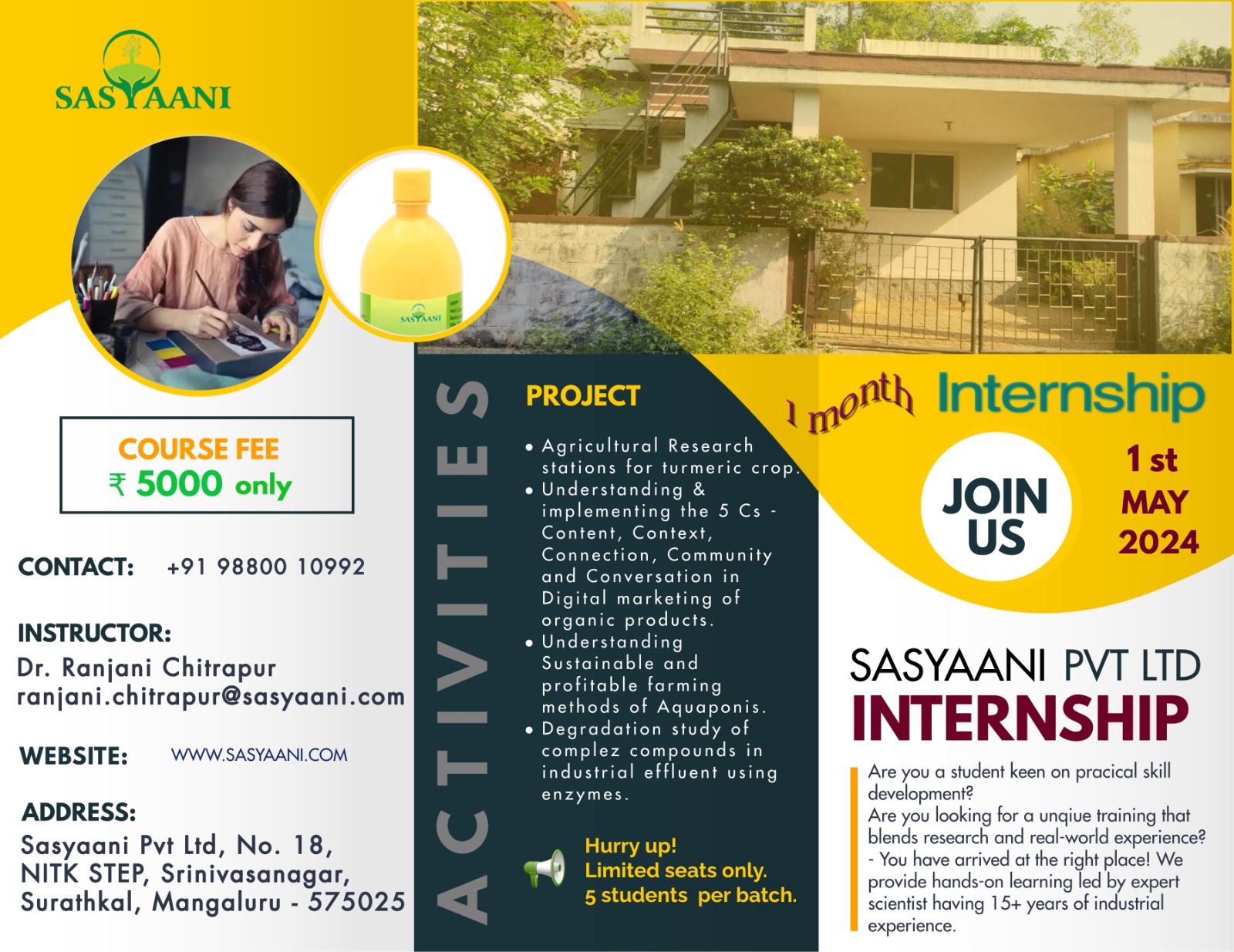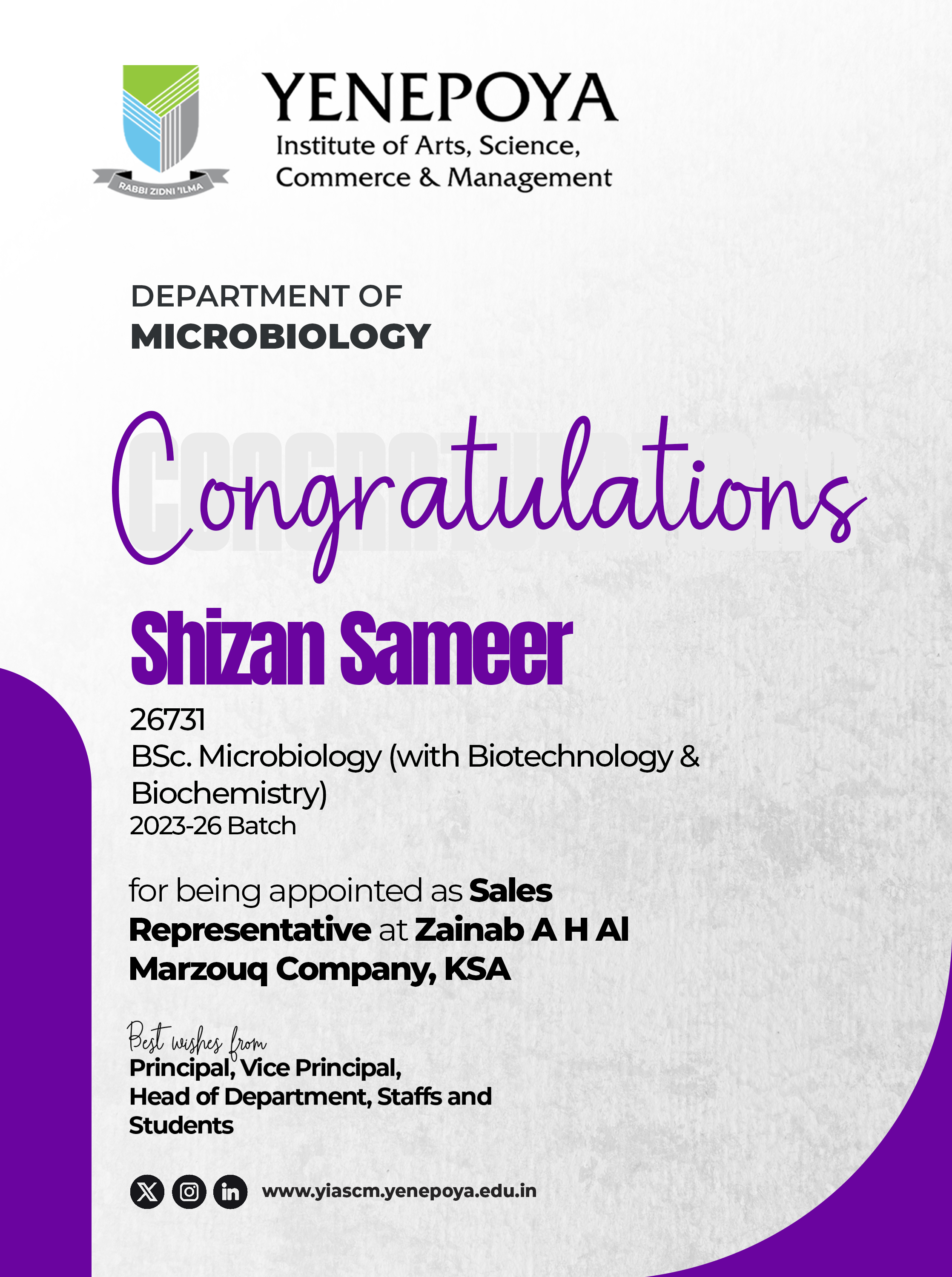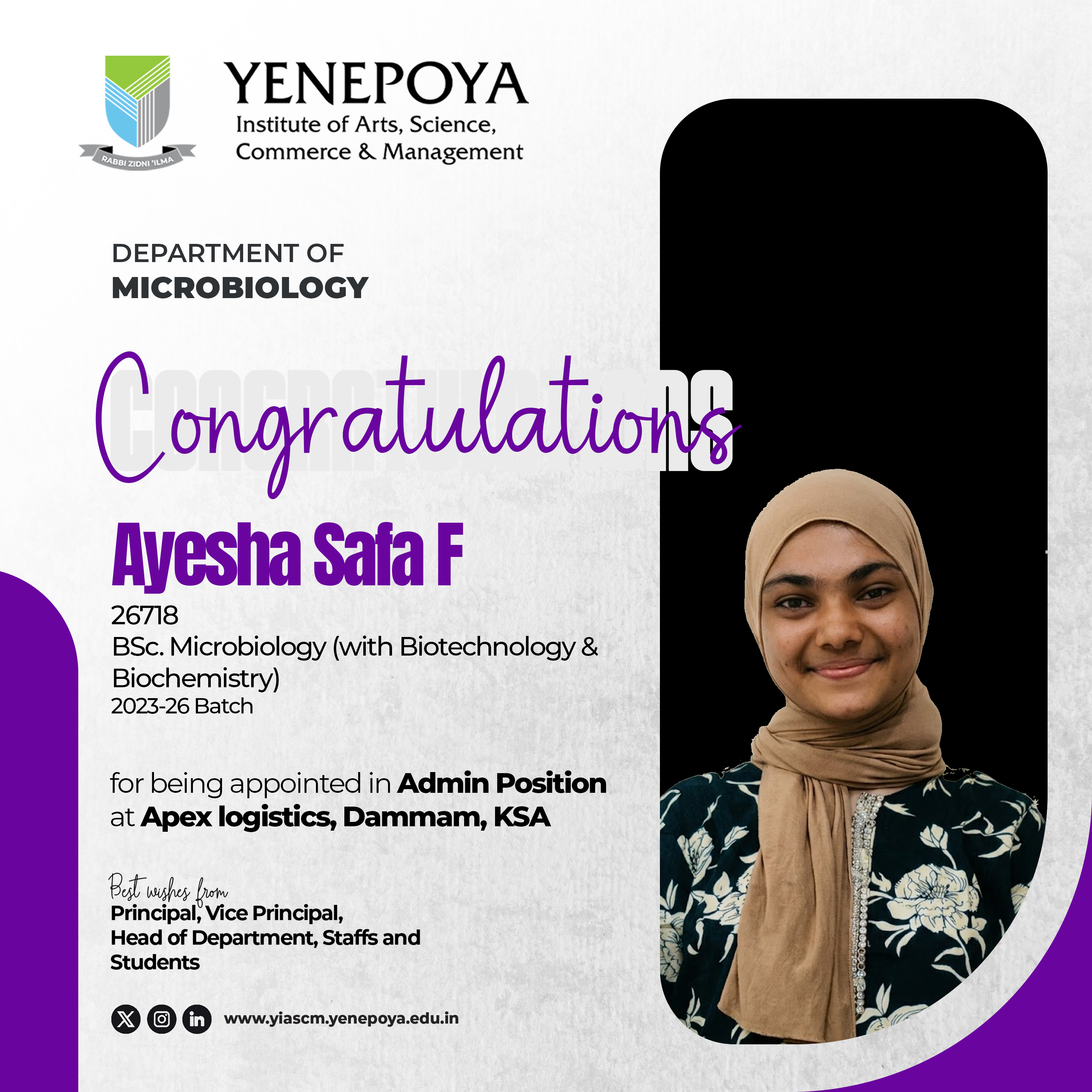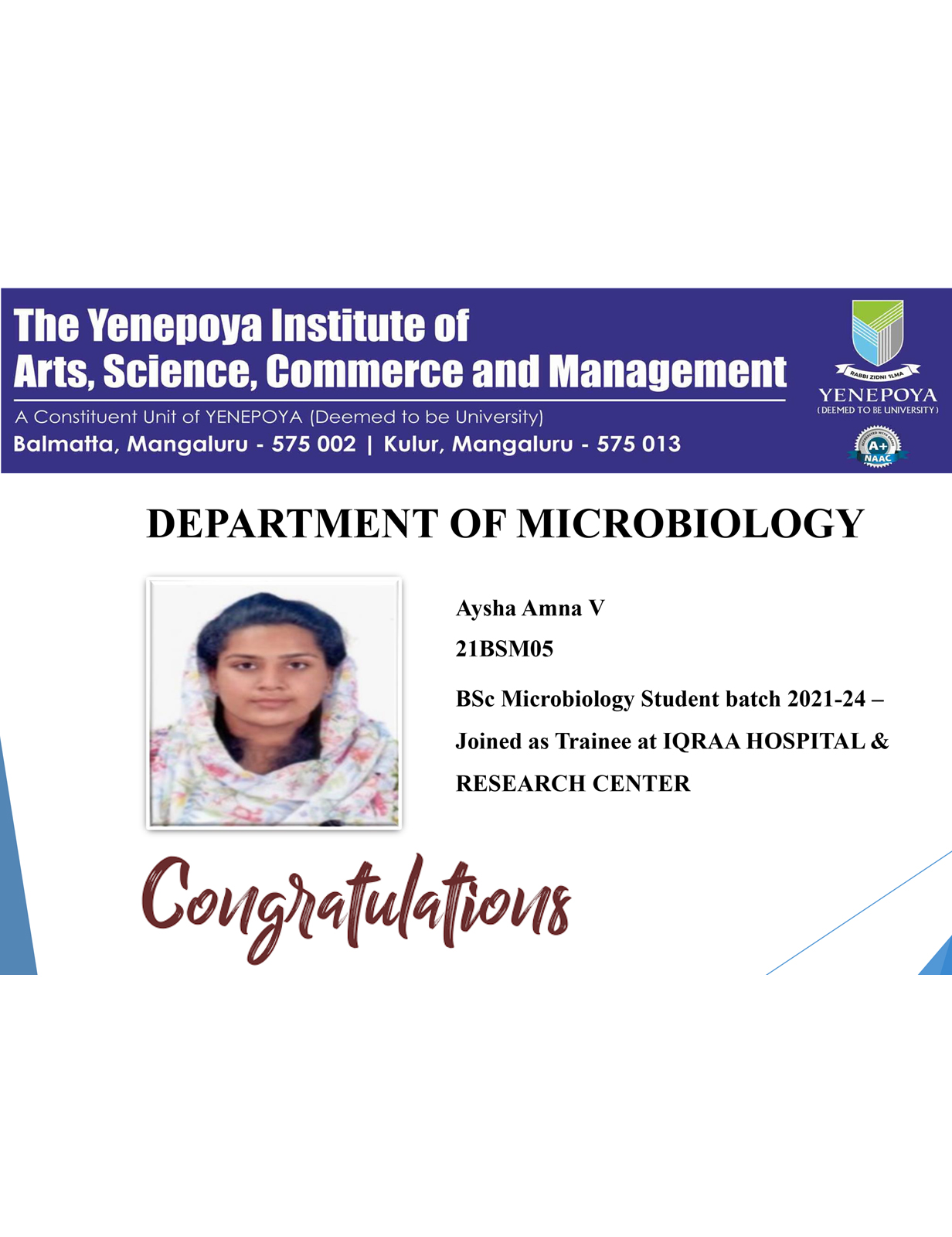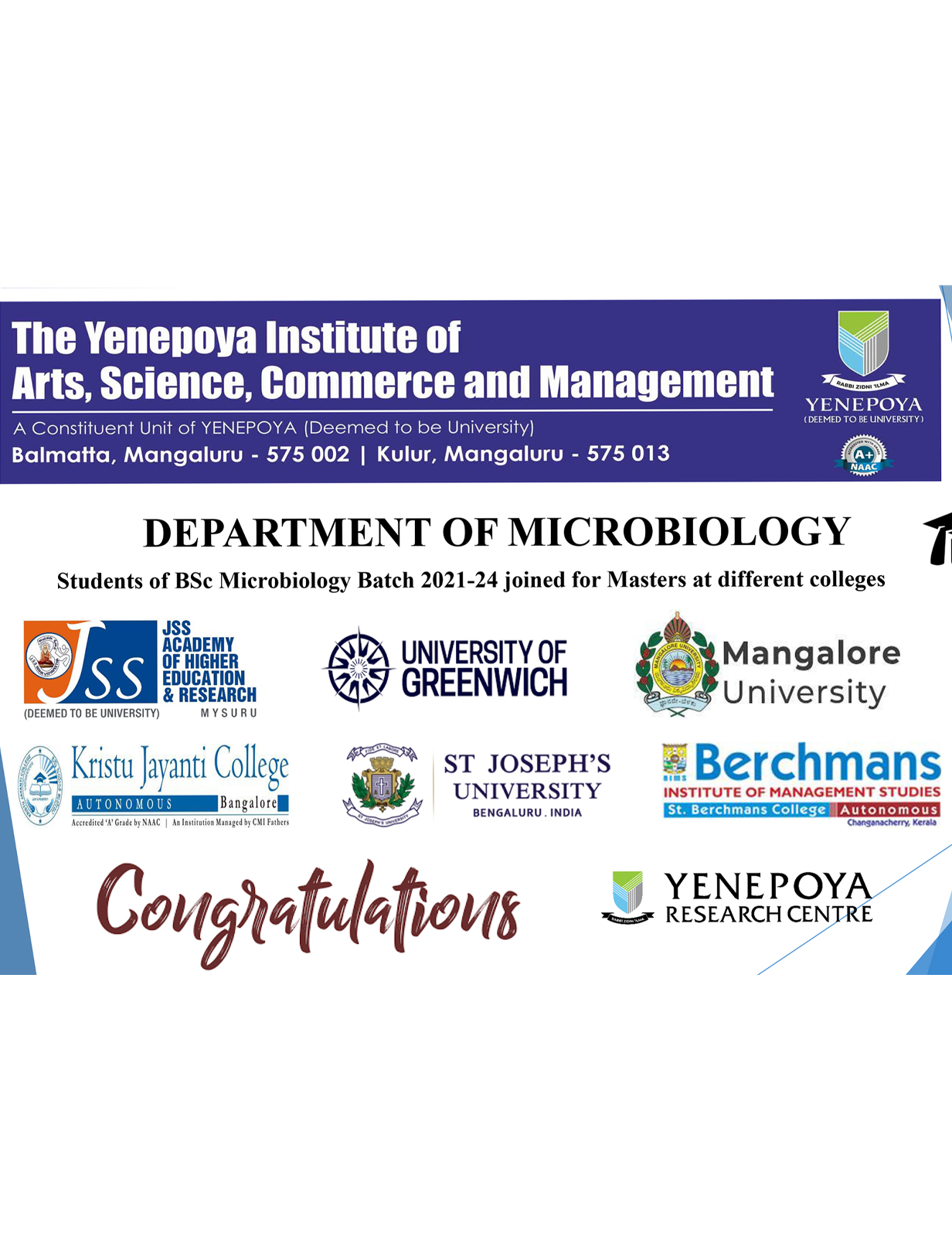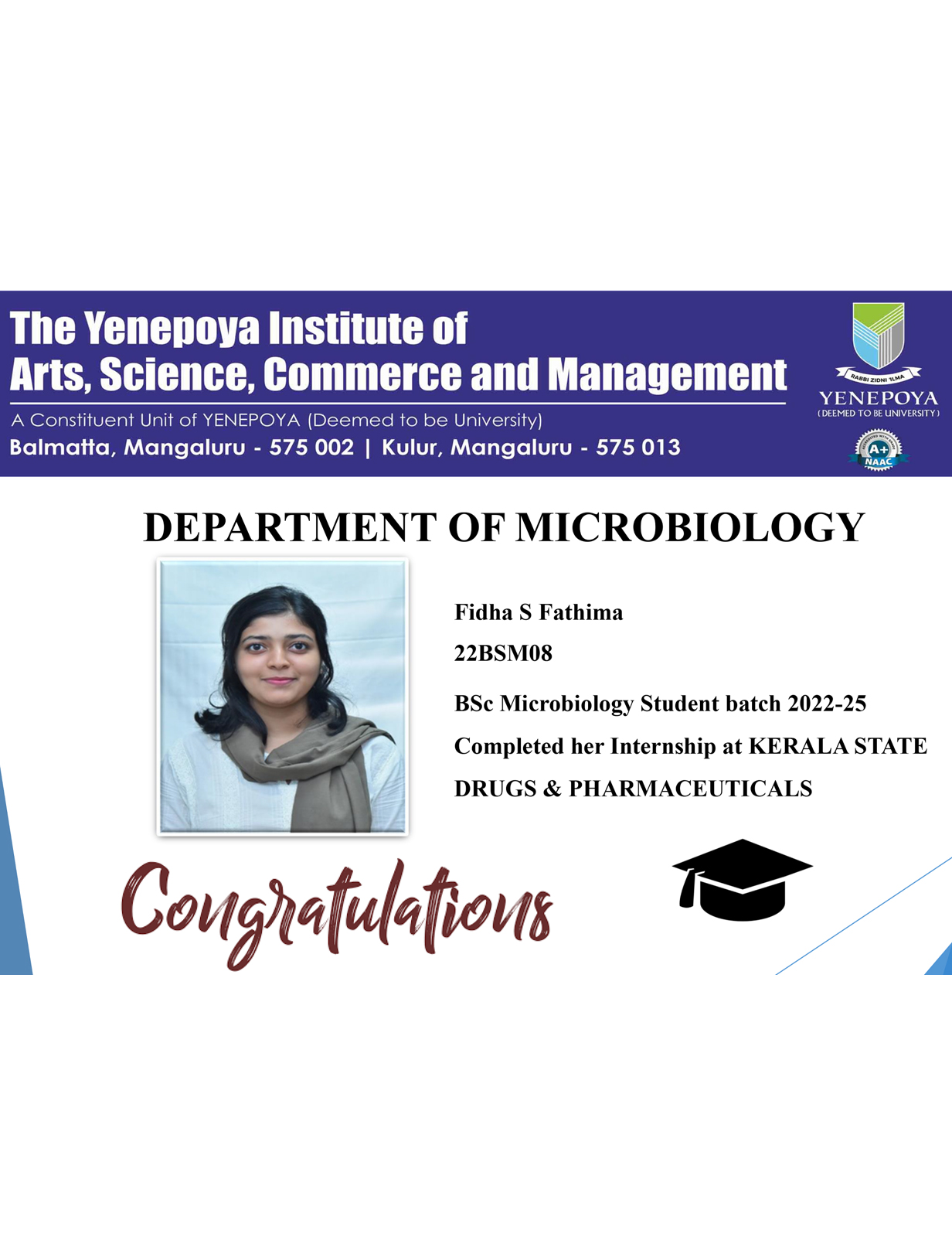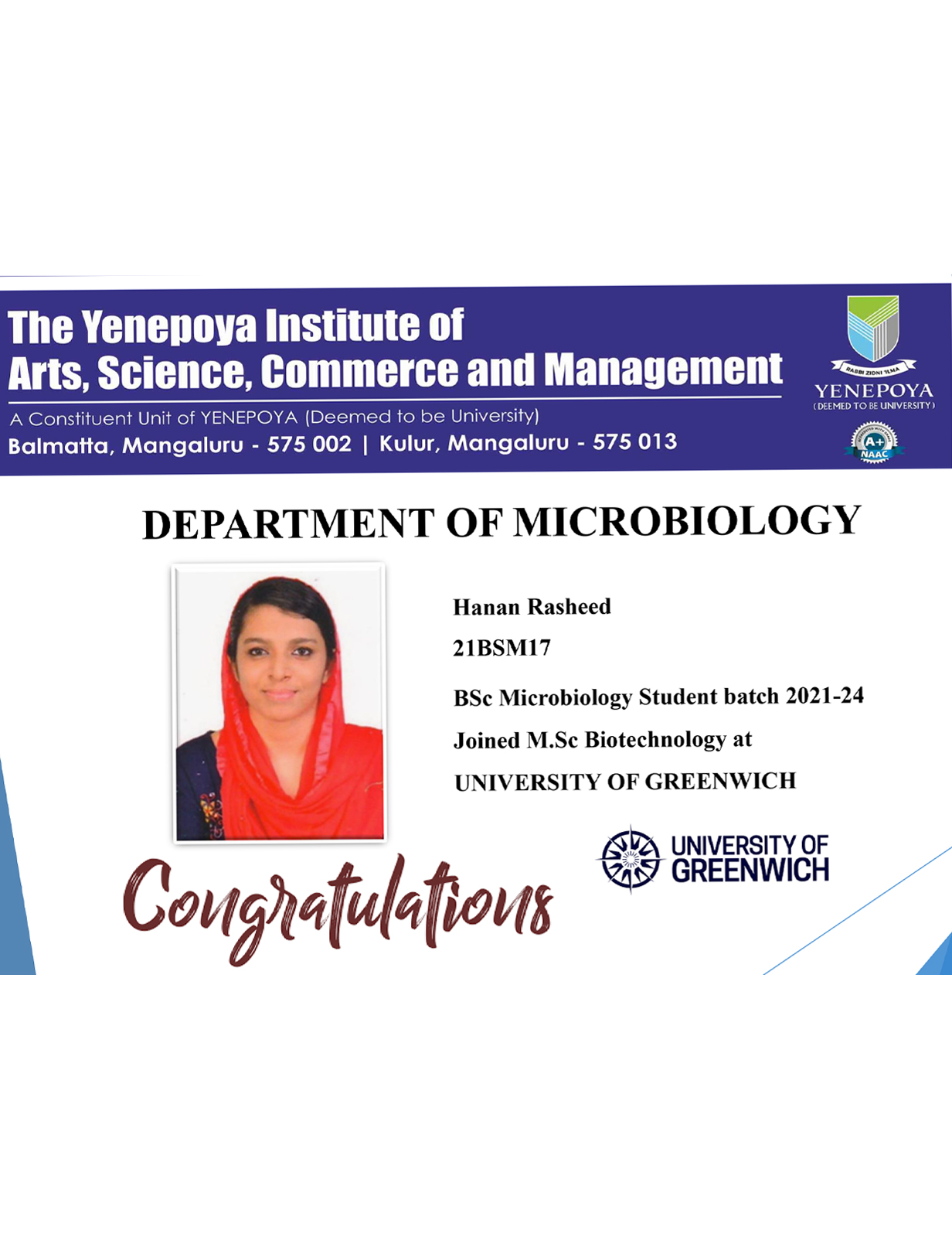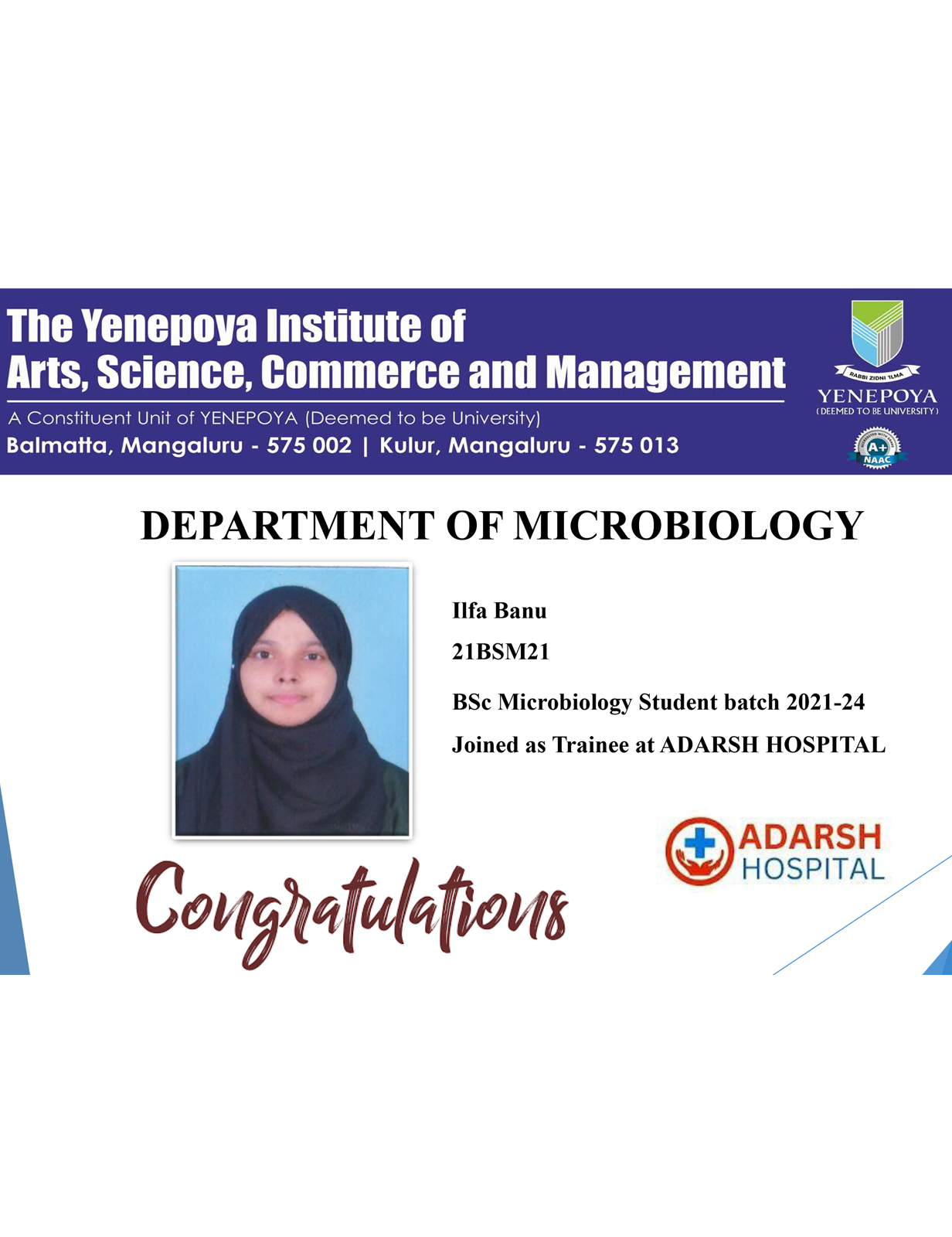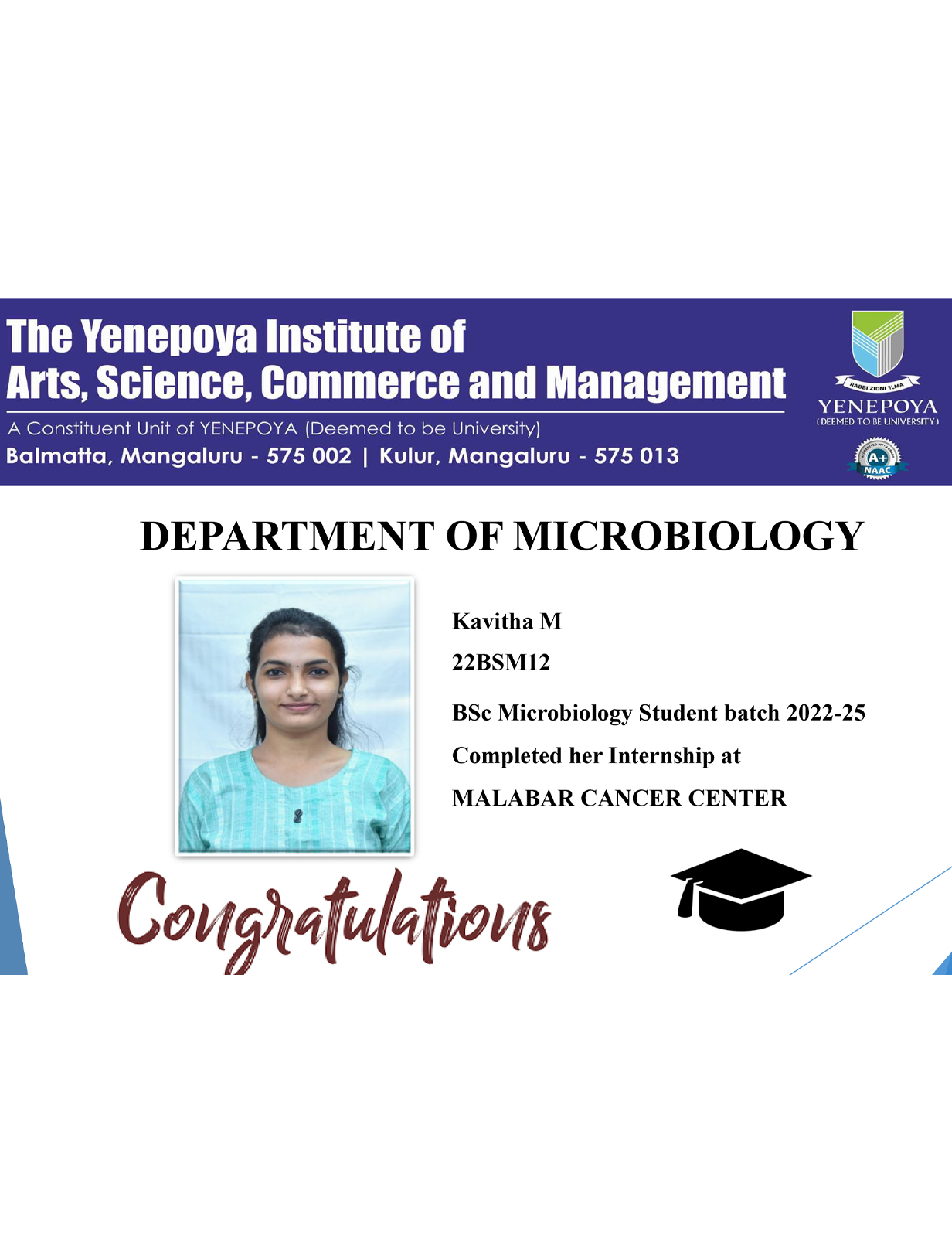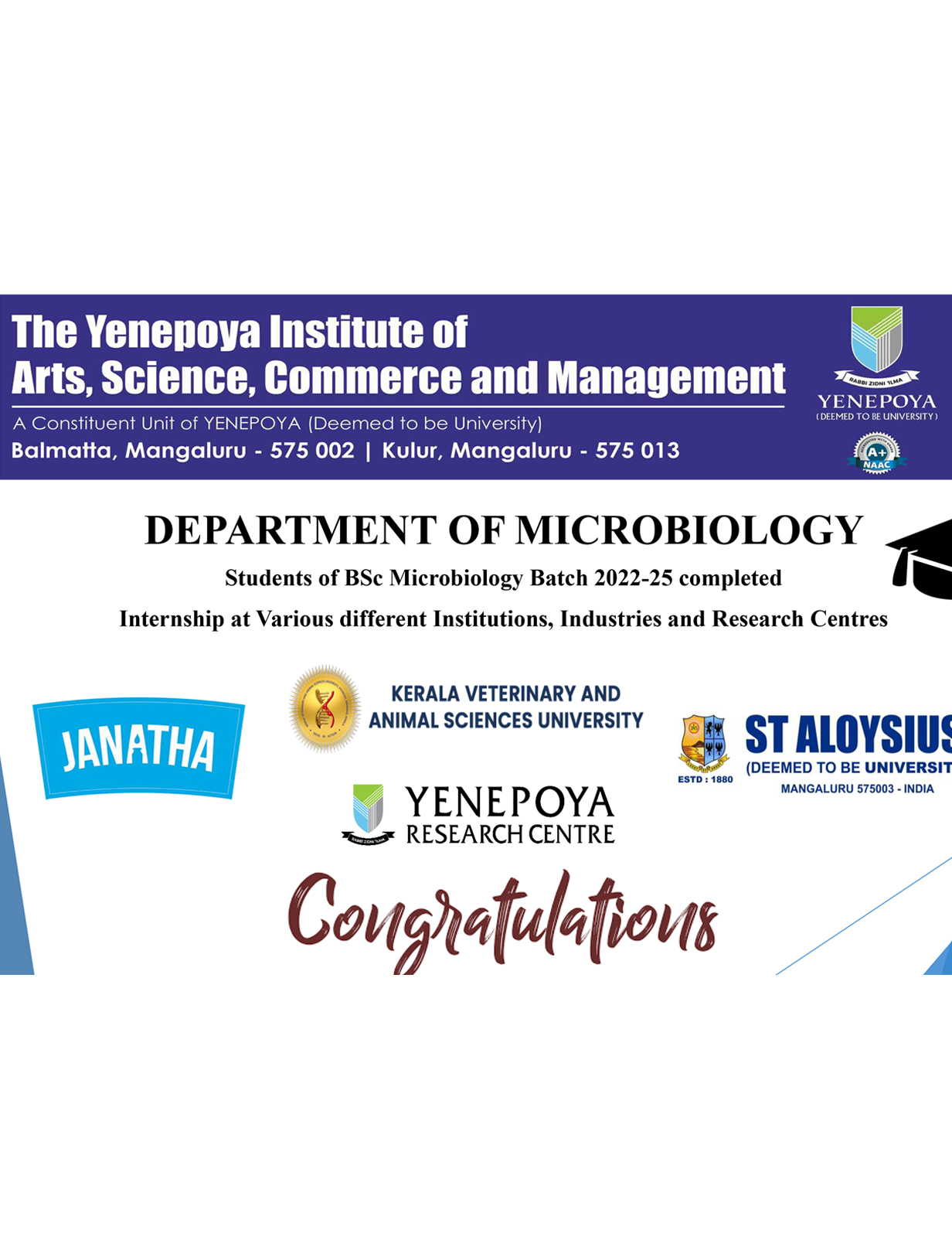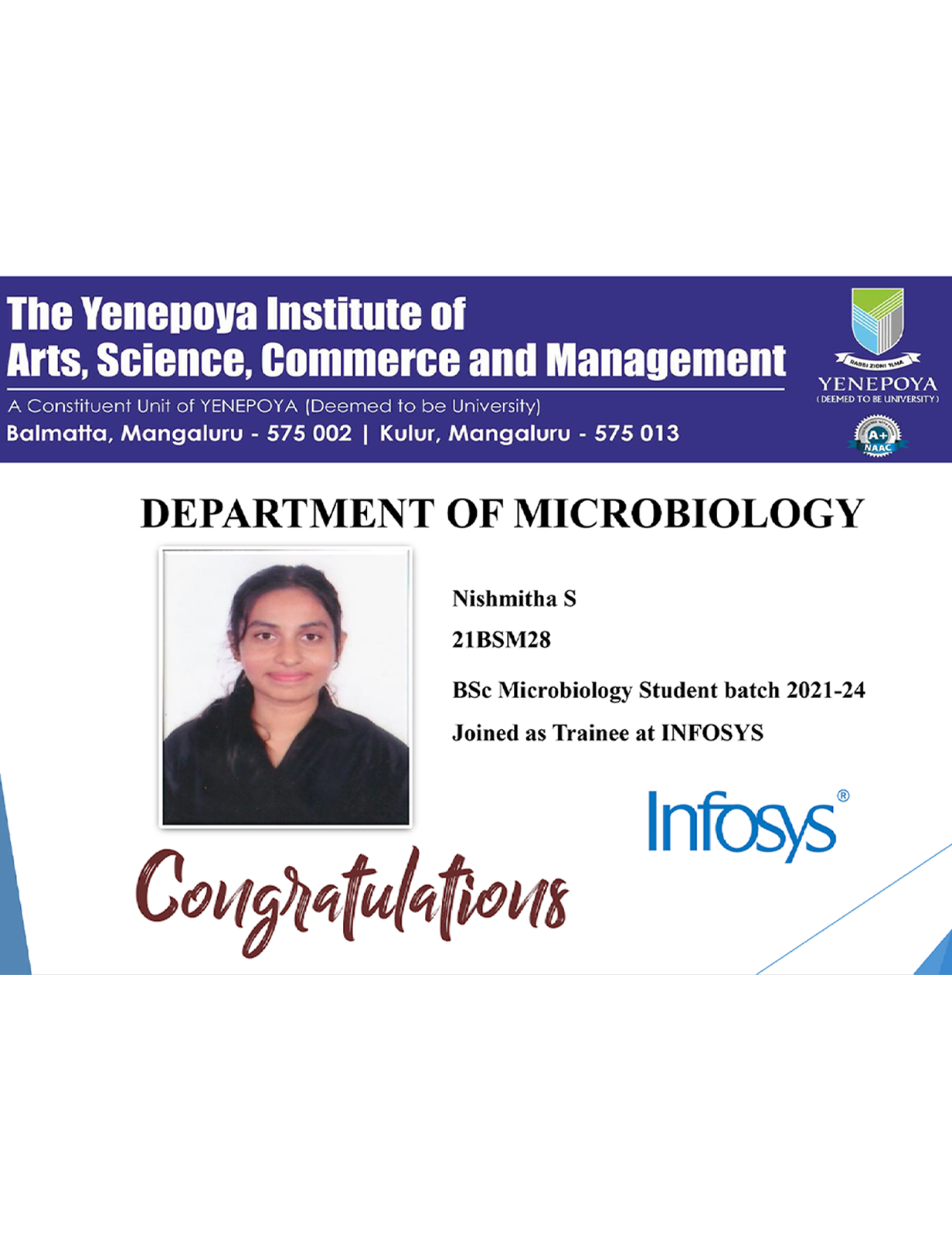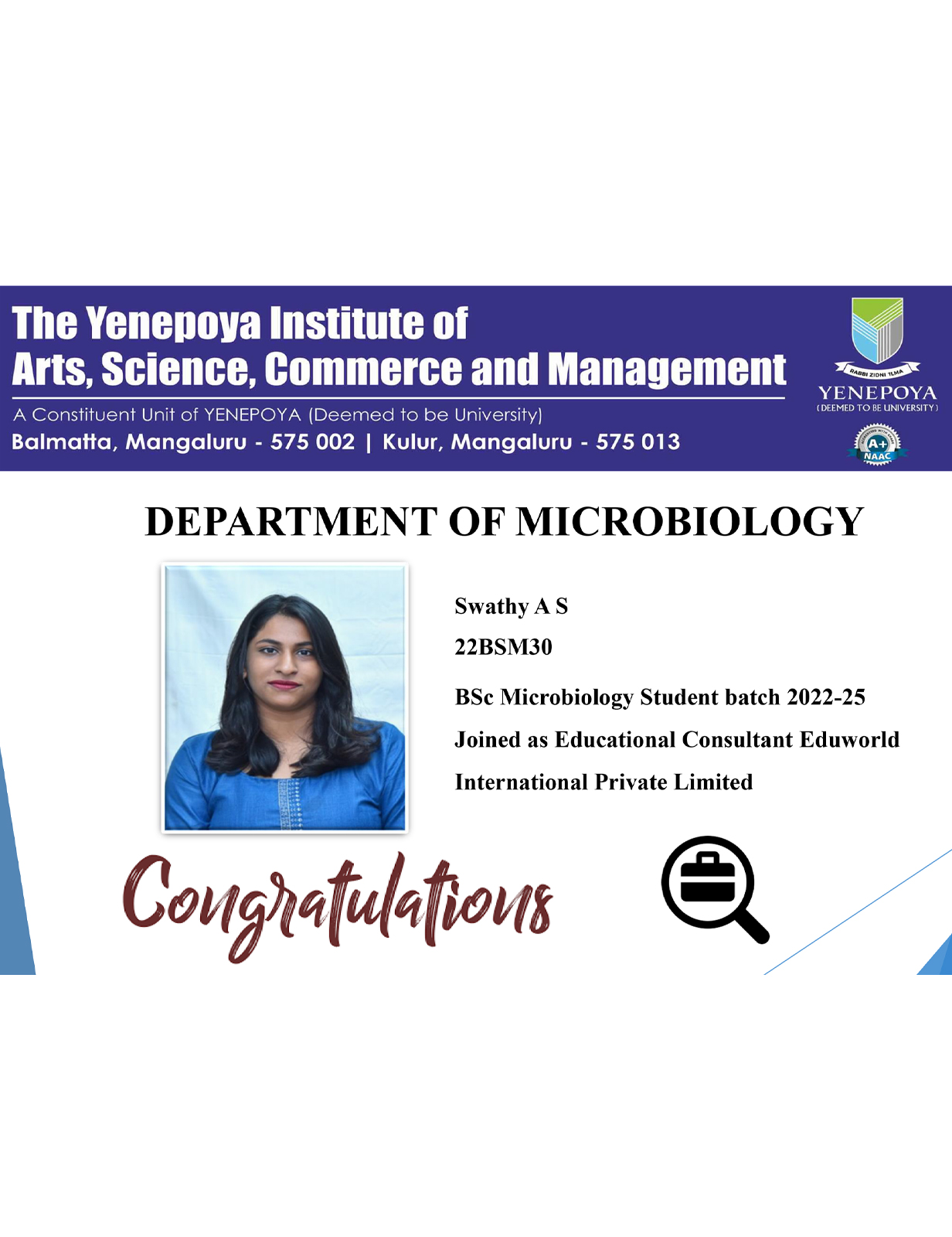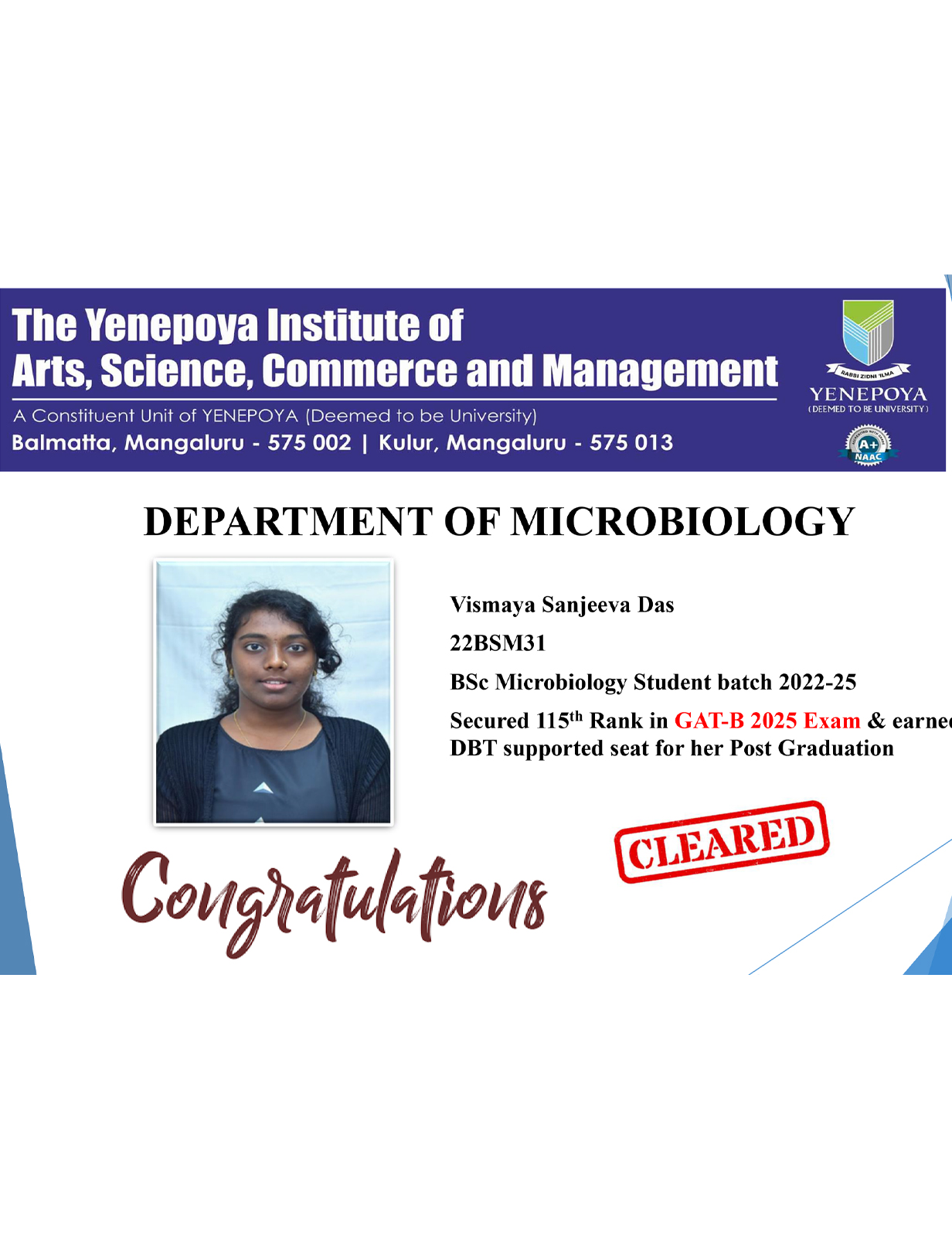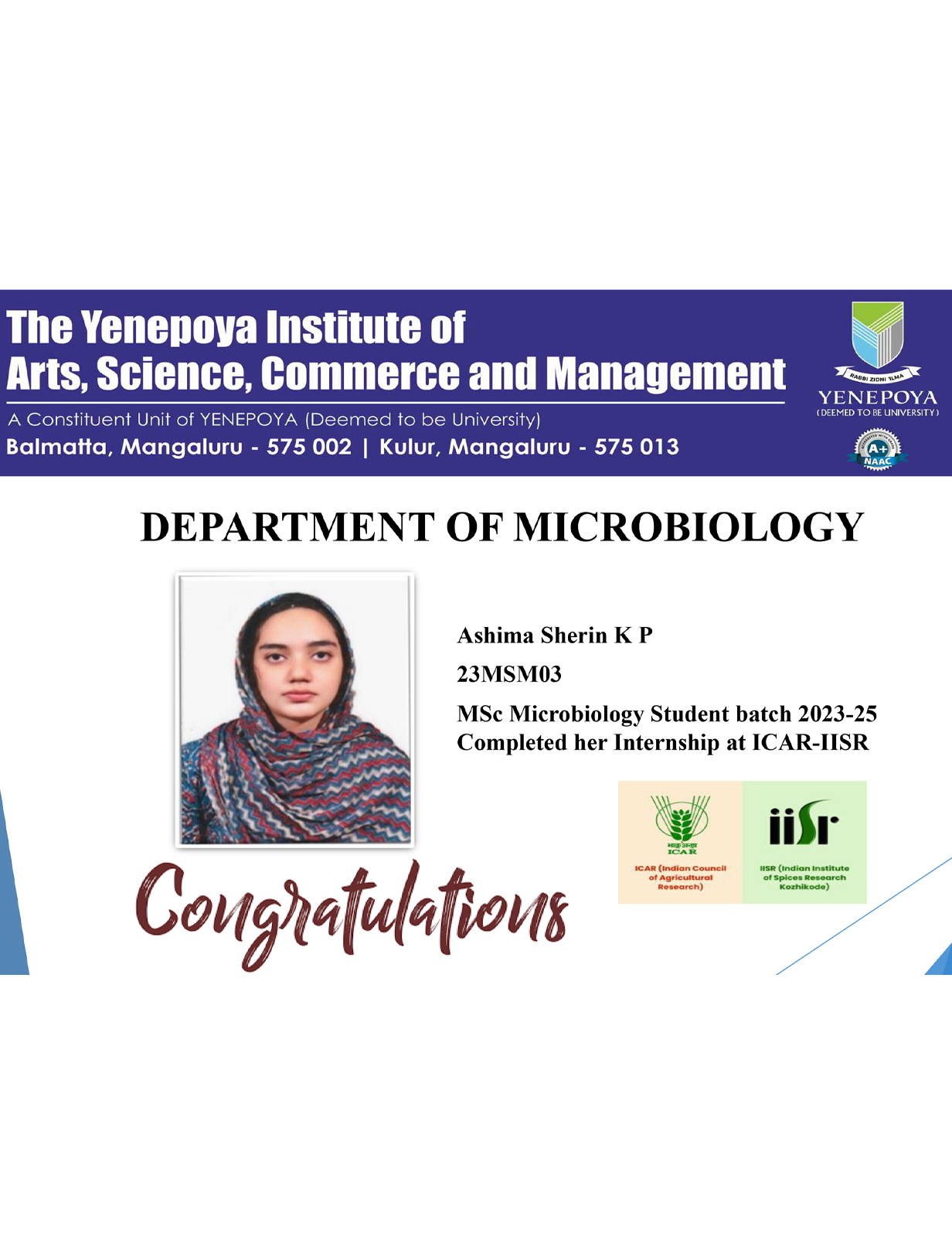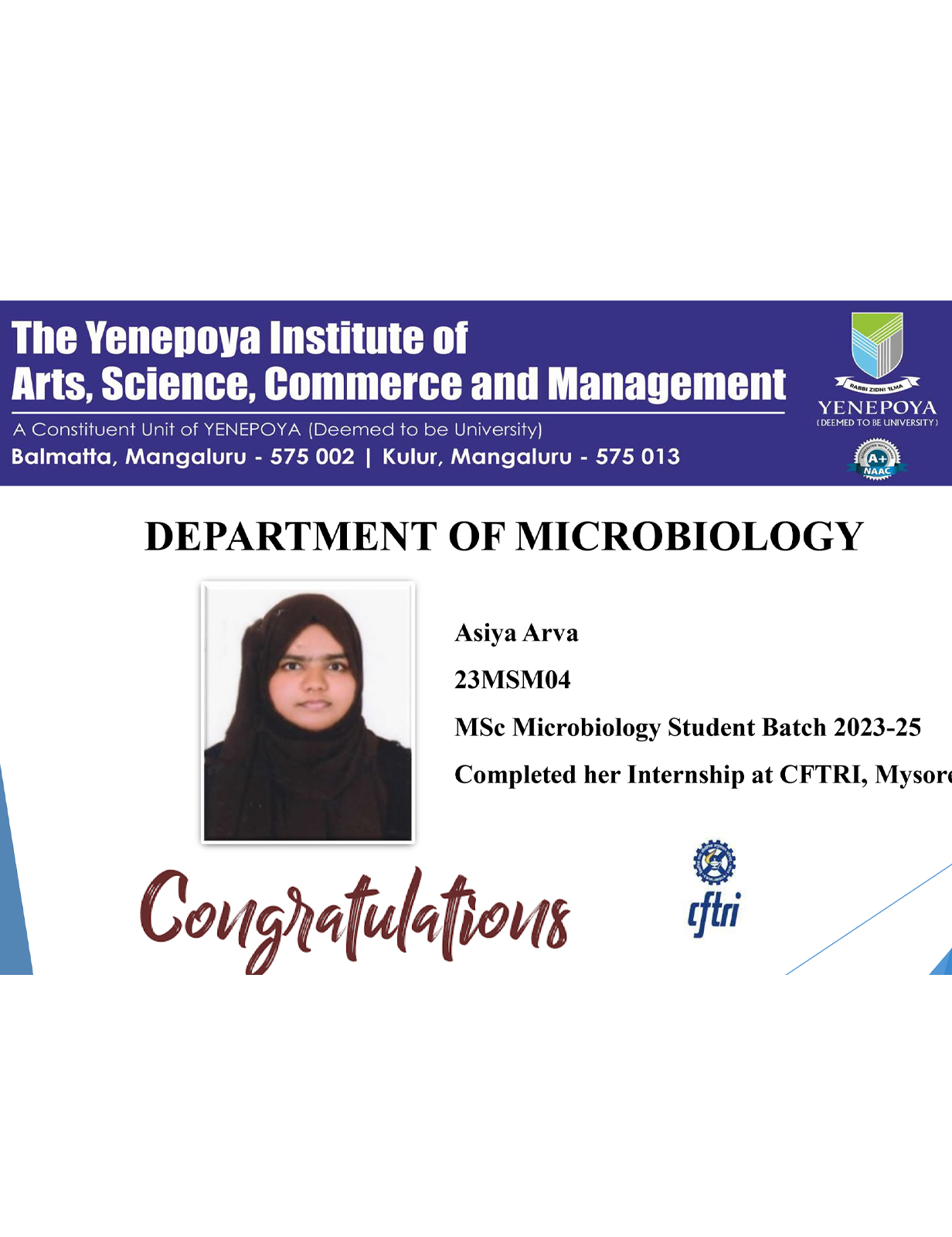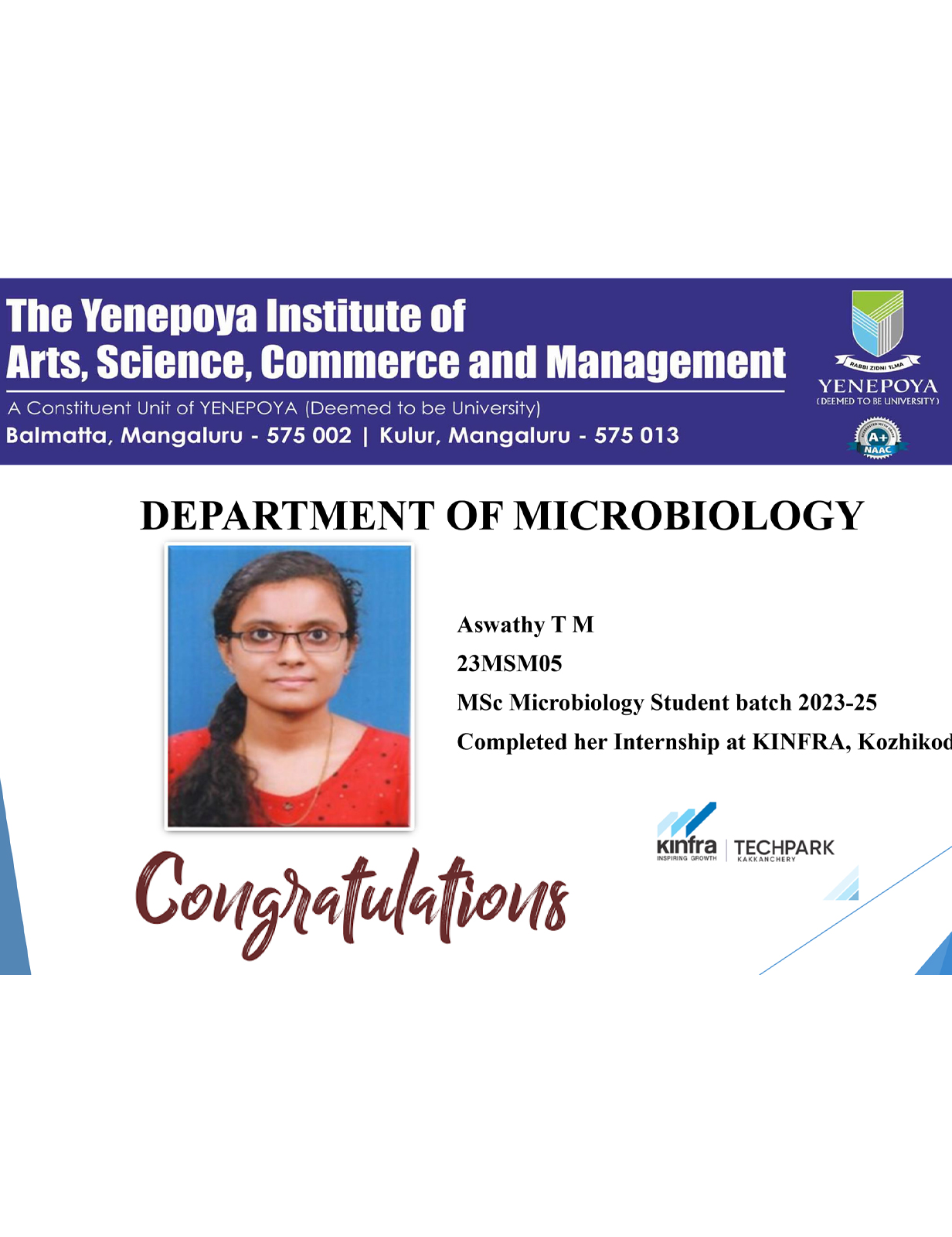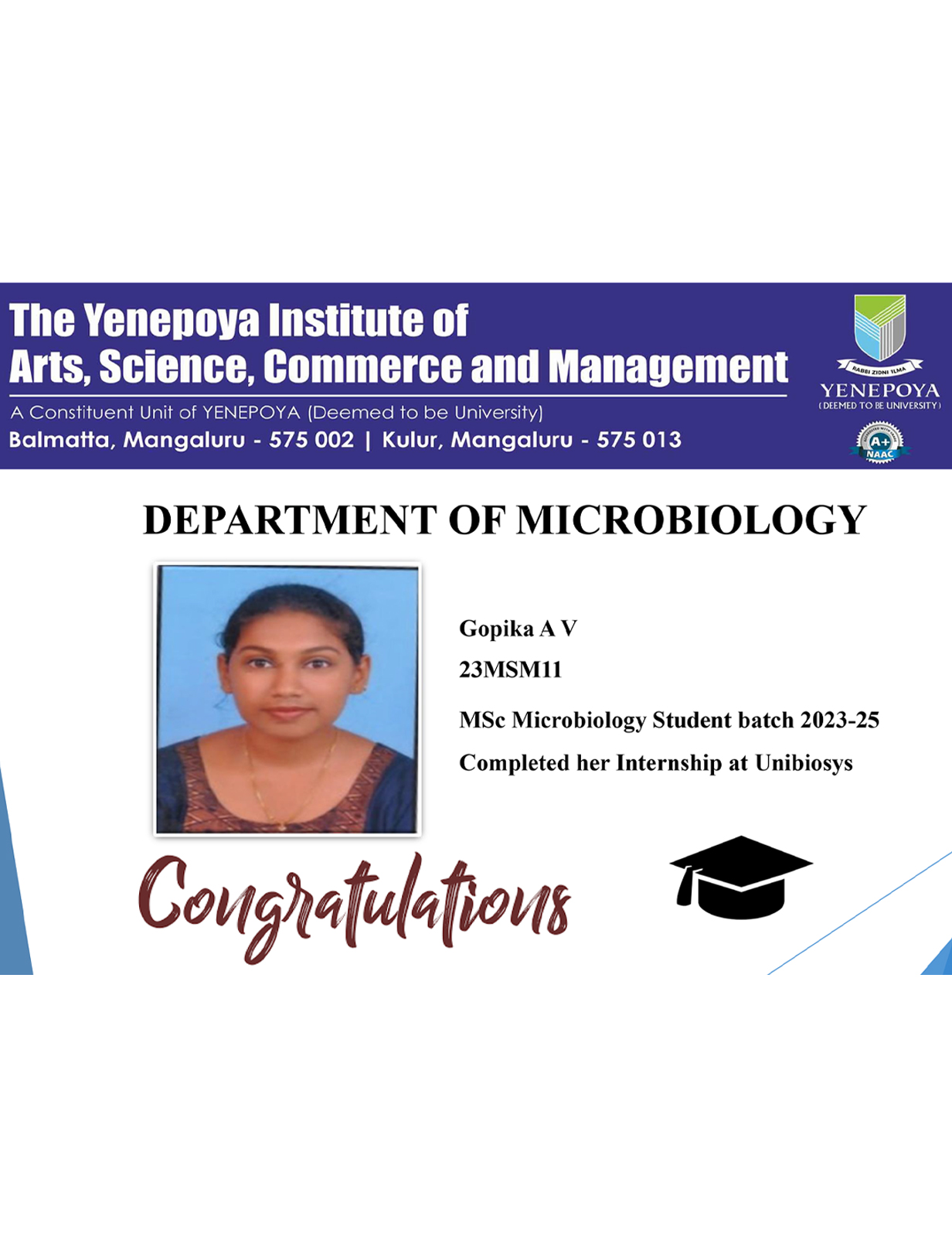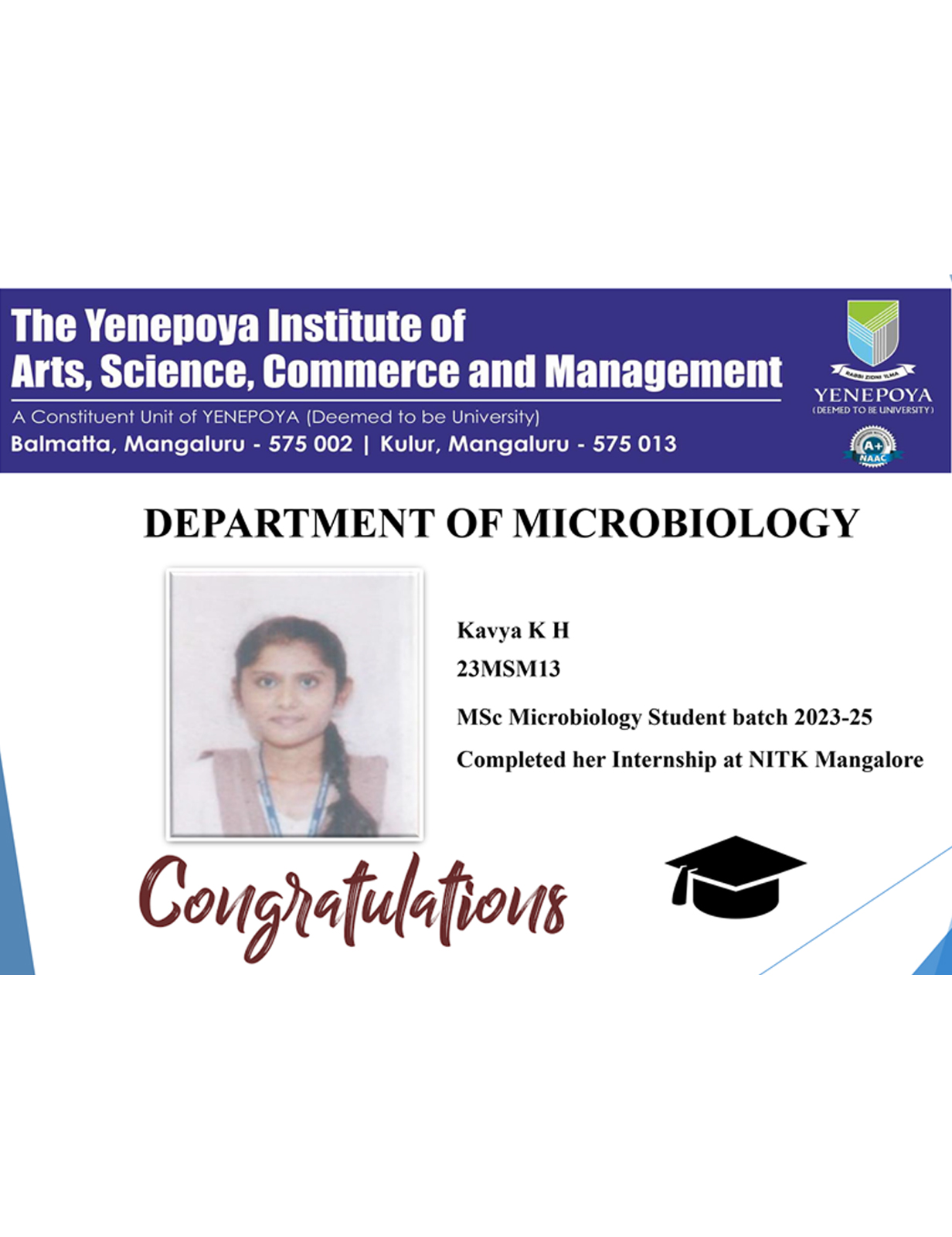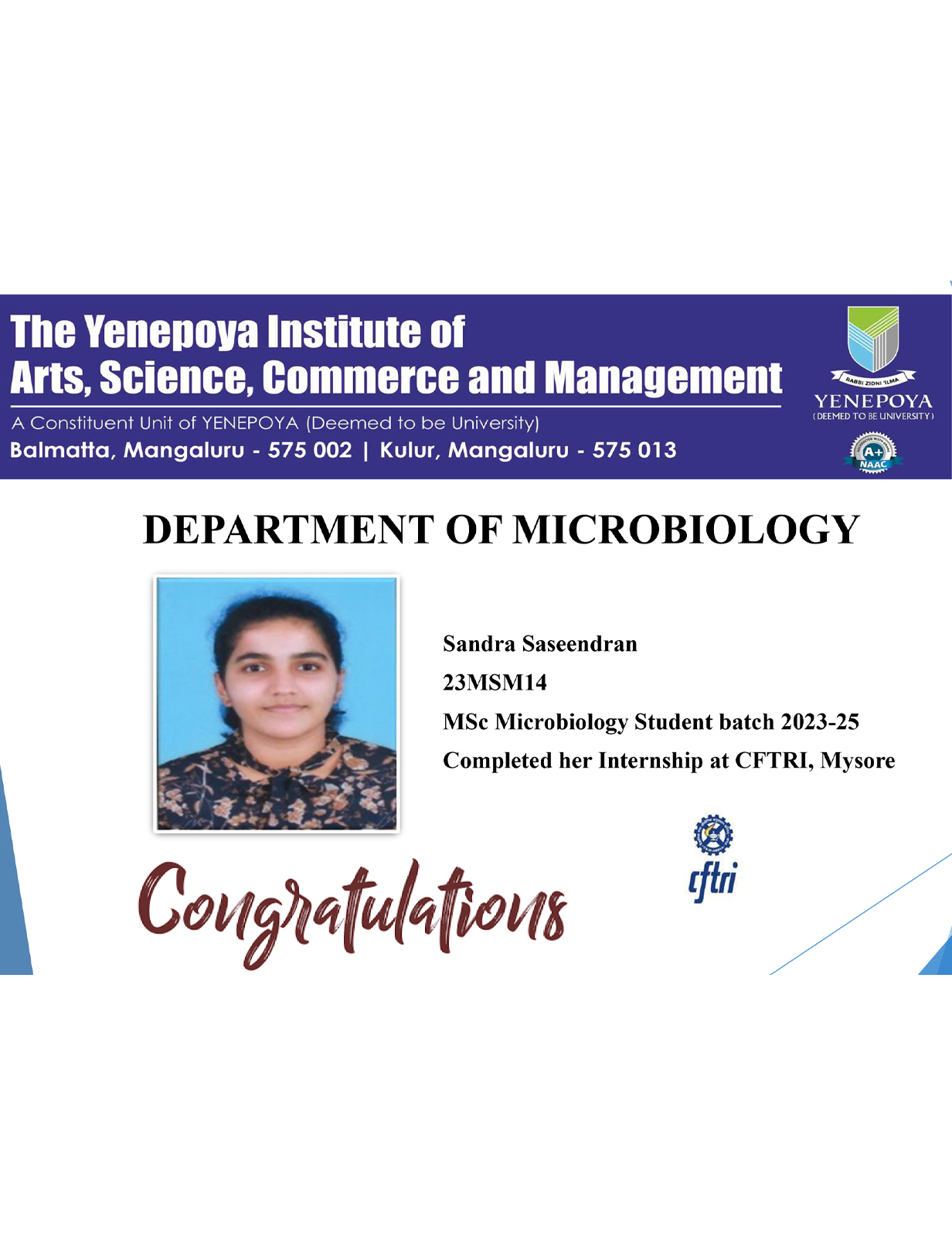Department of Microbiology
B.Sc. Microbiology with minor in Biotechnology and Biochemistry
Microbiology is the study of microorganisms such as viruses, bacteria, fungi, algae, and protozoa. Microbes are ubiquitous in the environment and are innately associated even with the human body. These microbes are involved in human, animal or plant diseases. Their beneficial aspects include their active role in maintaining chemical balance in nature, genetic engineering, pharmaceutical/nutraceutical production, fermentation, food production, etc. This B.Sc. Microbiology programme covers the in-depth aspects of microbiology in all the above areas using teaching and learning methods designed to enhance domain knowledge and critical thinking in students.
M.Sc. Microbiology
The Yenepoya Institute of Arts Science Commerce and Management (YIASCM) offers the MSc programme in Microbiology, providing students with a comprehensive understanding of this fascinating field and its applications across various industries.
The Master of Science (MSc) in Microbiology program builds upon the undergraduate programme, offering advanced coursework and research opportunities over two years. Students delve deeper into microbiology, exploring topics such as microbial diversity, microbial genetics, food microbiology, agricultural microbiology, industrial microbiology, immunology, medical microbiology etc. Through advanced laboratory work, research projects, and interdisciplinary approaches, students enhance their practical skills and critical thinking abilities.
To empower students with quality education to construct knowledge and skills in the field of microbiology, inculcate values, identify hidden talents, and provide opportunities to realize their full potential to shape them into future leaders, entrepreneurs and above all good human beings.
Introducing holistic and multidisciplinary Postgraduate and graduate education that would help develop all capacities of human beings - intellectual, scientific, social, physical, emotional, ethical, and moral - in an integrated manner; soft skills, such as critical thinking, creative thinking, communication skills and rigorous specialization in a chosen field of learning.
B.Sc. Microbiology with minor in Biotechnology and Biochemistry
Microbiology courses are one of the most sought-after courses in the field of biological sciences. The consequences of infectious diseases and the rise of epidemics or pandemics have stressed the role of microbiology in combating them. There is an immediate need for developing novel strategies to address issues related to food production, industrial products of general or specialized applications, and fighting environmental pollution. The science of microbiology in unison with other related subjects is the key to addressing these issues. This B.Sc. Microbiology programme equips the students with theoretical knowledge and practical skills making them competent individuals who can address the aforementioned issues.
M.Sc. Microbiology
Graduates of the MSc Microbiology programme are well-prepared for various career paths in academia, research institutes, pharmaceutical companies, and healthcare. Students engage in hands-on laboratory work, research projects, and develop critical thinking abilities. YIASCM supports the MSc programs with modern laboratories, specialized equipment, and resources necessary for conducting research and practical training in microbiology. Collaborations with industry partners enable internships, industry visits, and guest lectures, fostering real-world exposure and networking opportunities. The institute also offers career counselling, placement assistance, and guidance for further studies, facilitating successful transitions into careers or higher education.
Microorganisms are involved in diseases of humans, animals and plants. Conversely, they play a crucial role in maintaining health, production of life-saving antibiotics, enzyme production, alcohol fermentation, and the production of several other fermented foods. Microbes are also involved in the recycling of organic and inorganic matter in nature, and the degradation of pollutants. Thus, the science of microbiology has enormous importance in aspects of health, agriculture, environment and industries. Therefore, it is imperative to come up with a B.Sc. Microbiology programme that shapes graduates who are capable of addressing the pressing needs of the aforementioned areas as either industry-ready individuals or students who opt for higher education and research.
The B.Sc. Microbiology programme opens avenues of microbiology-related careers requiring general graduate-level aptitude. After graduating with this degree, a student may take up the following job roles among many:
- Microbiologist - In industries like food, beverage, biotechnology and pharmaceuticals.
- Quality control microbiologists in different industries.
- Microbiologist - In hospitals, diagnostic laboratories, agricultural departments, environmental agencies, and research organizations.
- Research assistants in research laboratories.
Students may also proceed in academia and progress to higher education, taking up postgraduate programmes in microbiology or other relevant subjects.
B.Sc. Microbiology with minor in Biotechnology and Biochemistry
A candidate who has passed the two years of Science Pre-University Examination
conducted by the Pre- University Education Board in the State of Karnataka or any
other examination considered as equivalent thereto by the university is eligible for
admission to these programmes.
a. Passed Class XII (10+2) from a recognized Board in science stream.
MSc Microbiology
Any student who has passed B.Sc. (Hons.) in Botany, Zoology, Life Science, Environmental science, Microbiology, Biotechnology, Pharmacy, MBBS, BVSc and any other life sciences degree having minimum of 55% marks in Graduation can take this course.
B.Sc. Microbiology with minor in Biotechnology and Biochemistry
This bachelor-level programme of B.Sc. in Microbiology is developed incorporating contents that are required for employability and to facilitate progression into higher education. The self- directed learning component challenges the students to experience the concept of life long learning. The students of this programme will experience various methods for learning the concepts, practical skills, and competencies. The training and learning from field visits and internships provide possibilities for increasing their skills. The courses focusing on soft skills are aimed to prepare the students to incorporate professionalism and teamwork with higher levels of emotional and social empathy.
B.Sc. Microbiology with minor in Biotechnology and Biochemistry
This B.Sc. Microbiology programme is aligned with the National Education Policy 2020. The programme imparts in-depth knowledge in microbiology and allied subjects such as biochemistry and biotechnology. The programme focuses on employability and progression into higher education. The emphasis is on sharpening the theoretical knowledge and practical skills necessary in industries or academia. The teaching-learning processes in the classroom, laboratory training, exposure to industries, interaction with industry experts, and research projects aid in achieving competency by the students of this programme.
B.Sc. Microbiology with minor in Biotechnology and Biochemistry
- Equip students with a comprehensive understanding of original microbiological concepts, theories, and techniques.
- Enhance students' critical thinking abilities to analyze scientific literature and current research trends in microbiology.
- Promote awareness of the societal and environmental impacts of microbiology, encouraging students to contribute positively to their communities.
B.Sc. Microbiology with minor in Biotechnology and Biochemistry
The student graduating with the Degree of B.Sc. Microbiology should be able to acquire the following competencies and skills
- Disciplinary knowledge
- Skills
- Analytical
- Critical thinking
- Problem-solving Research & scientific reasoning
- Reflective thinking
- Attitudes Communication and collaboration
- Lifelong learning
- Moral and ethical awareness
- Leadership
- Teamwork
Hence, the following programme outcomes are defined.
- PO 1: Knowledge Acquisition: Describe systematically and coherently the fundamental concepts in microbial diversity, microbial physiology, microbial metabolism, and cell and molecular biology.
- PO 2: Interdisciplinary Integration: Explain the basic concepts in biochemistry, pharmaceutical chemistry, clinical biochemistry and principles of instruments used for laboratory investigations.
- PO 3: Research and Analytical Skills: Perform experimental laboratory techniques and methods in the areas of microbiology, biotechnology and biochemistry.
- PO 4: Technical Proficiency: Practice the technical skills in various domains of biotechnology.
- PO 5: Laboratory Management: Employ biotechnology processes and products in biosafety, environment safety and quality control approach suitable for industry and research practices.
- PO 6: Ethical Conduct: Demonstrate teamwork, ethical responsibility, societal and environmental impacts of microbiology through innovative approaches.
- PO 7: Collaboration and Communication: Develop critical thinking ability to solve problems related to operational and technical issues about analytical approaches in microbiology.
- PO 8: Application of Microbiology :Optimize the experiments to explore in different fields of microbiology including soil, agricultural, medical microbiology and immunology.
M.Sc. Microbiology
- PO1: Integrate knowledge from microbiology with other applied disciplines such as food microbiology, industrial microbiology, soil and agricultural microbiology and genetic engineering.
- PO2: Apply interdisciplinary approaches to address global and societal challenges related to microbiology.
- PO3: Demonstrate skills in laboratory management from various sub-disciplines of microbiology, including molecular biology, microbial genetics, microbial physiology, immunology, medical microbiology and environmental microbiology.
- PO4: Implement quality control and quality assurance measures in microbiological processes.
- PO5: Apply microbiological knowledge and skills to real-world problems in healthcare, industry, agriculture, and environmental management
- PO6: Develop oratory, scientific conversation, analytical, problem-solving and writing skills.
- PO7: Assemble their knowledge in to an industry involving isolation of microbes from natural sources, drug discovery, contract research, Product development, standardization techniques etc.
- PO8: Engage in outreach activities and contribute to public education on microbiological issues and their impact on health and the environment.
M.Sc. Microbiology
- PSO 1 Define microbial taxonomy, diversity, distribution in natural environment and other sources.
- PSO 2 Describe microbial physiology, metabolism and their role in production of economically important products.
- PSO 3 Operate various instruments employed for sterilization, growth and to study metabolism of microorganisms.
- PSO 4 Classify various microbial infections, their transmission, control, prevention and treatment.
- PSO 5 Formulate various consortia of bacteria and fungi to be applied in fields Like food, soil, agriculture and medicine .
Meet our Experts
coming soon . . .
coming soon . . .
coming soon . . .

